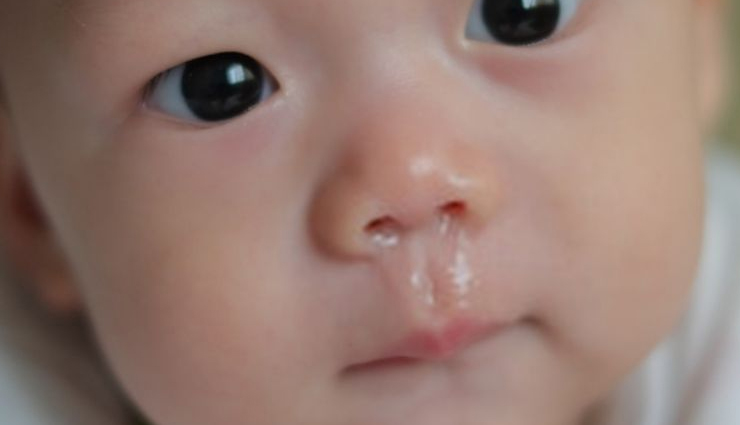- Home›
- Healthy Living›
- 6 Major Symptoms Of Nasal Congestion In Infants
6 Major Symptoms Of Nasal Congestion In Infants
By: Priyanka Maheshwari Thu, 24 Aug 2023 8:04:37

Nasal congestion in infants poses a level of inconvenience comparable to that in adults. Although adults might manage it better, infants can undergo significant discomfort due to this condition. Beyond causing issues with breathing, a congested nasal passage can create difficulties for babies in ingesting food. Furthermore, it disrupts their sleep patterns, potentially leading to either waking up in a fussy and agitated state or experiencing difficulty falling asleep at all.
Consequently, a blocked nasal passage can have notable repercussions on both the well-being and temperament of your baby. To assist you in addressing this matter, we've compiled some valuable information. This article aims to provide you with insights into nasal congestion in babies, encompassing its causes, indications, and strategies for managing it.

Symptoms Of Nasal Congestion
# Excessive Nasal Discharge
The nose consistently excretes mucus, an unending flow that eludes control. After a single wipe, the situation quickly becomes untidy once more.
# Audible Breathing Noise
Each inhalation and exhalation of the baby produces a noticeable 'whistling' sound. The intensity of the sound can vary, ranging from sharp to high-pitched, depending on the seriousness of the condition.

# Snoring Occurrence
Snoring can manifest due to various factors, and one of them is nasal congestion. If the baby experiences noisy breathing while awake, it's probable that snoring will ensue during sleep.
# Nose Interference by Baby
Infants lack comprehension of their nasal situation. Hence, to mitigate the obstruction, they may employ their fingers to pick at their nostrils. This behavior typically emerges in older infants with more developed finger coordination.
# Sneezing
While sneezing aids in clearing the nasal passages, it can occasionally exacerbate blockage. A congested nose triggers stimulation of nerve endings within the inner nasal lining, leading to an automatic sneezing reflex.

Causes of Nasal Congestion In Babies
Nasal congestion can arise from various underlying issues that trigger mucus accumulation or inflammation of the nasal tissue, both of which result in obstructed breathing. Due to their small nostrils, infants, particularly those under two months old, primarily rely on nasal breathing. Even older babies struggle with breathing through their mouths. The subsequent factors account for the occurrence of nasal congestion in infants:
- Common cold
It stands as the primary factor behind runny noses in infants. Although there exist more than 200 viruses responsible for the common cold, the prevalent one is rhinovirus. Cold-causing viruses prompt heightened production of dense nasal mucus and the inflammation of the inner nasal lining. This constriction impedes the airflow into the nasal passages, resulting in nasal congestion.
# Influenza
The indications of influenza resemble those of the common cold, yet infants with the flu typically experience elevated body temperature. Influenza commonly presents with nasal discharge rather than nasal inflammation, as the flu virus predominantly affects the nose, throat, and respiratory system.

# Allergies
Similar to the common cold and influenza, allergies can result in nasal congestion among infants. Various allergens, including pollen, possess the capability to irritate the nasal passages, prompting an excessive production of mucus. An example of such an allergic response is rhinitis, often referred to as hay fever, which can contribute to nasal blockage in babies.
# Inflamed tonsils or adenoids
Tonsils and adenoids are components of the lymphatic system. Functioning as the initial immune defense, they have the potential to induce nasal congestion if infection occurs. In instances of their enlargement, tonsils or adenoids could exert pressure on the nasal passages, leading to their constriction and subsequent obstruction of regular airflow.
# Irritants
The causes can span from pollution to arid air. Any factor capable of irritating the inner nasal environment holds the potential to stimulate an overproduction of mucus. In the case of dry air, the mucus might desiccate and solidify, leading to breathing challenges.
# Foreign body in the nose
The cause of the runny nose might be as straightforward as your baby inserting an object into their nostril while playing. Babies are naturally curious and often explore objects with their mouth. During particularly playful moments, they might insert something deep into their nose, encountering challenges when attempting to extract it. This foreign object could decay, potentially leading to an infection and subsequent nasal congestion.





